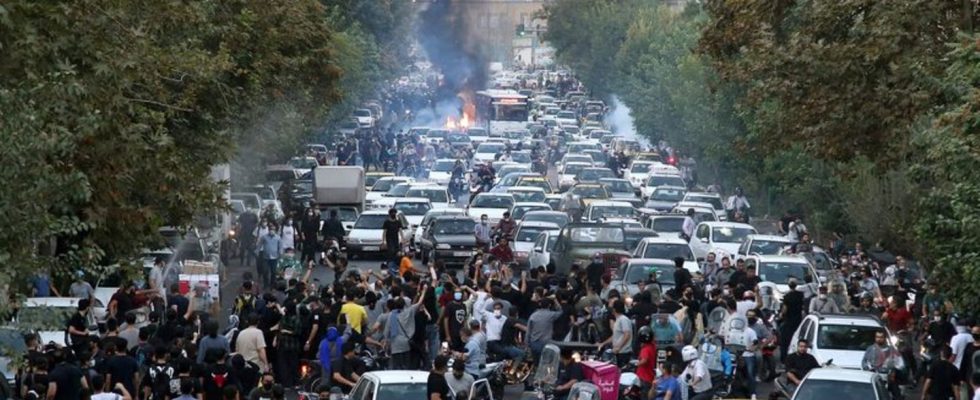Kurdish region
Anniversary of Amini’s death: tension in Iran, solidarity abroad
The death of the Iranian Kurdish woman Jina Mahsa Amini sparked heavy protests in Tehran. photo
© Uncredited/AP/dpa
It is the first anniversary of the death of Iranian Kurdish woman Jina Mahsa Amini, which sparked the most serious protests in the Islamic Republic in decades. Solidarity is also evident in Germany.
Iranian emergency services took strict security precautions on the anniversary of the protest icon’s death Jina Mahsa Amini placed the Kurdish regions in a state of emergency. Amini’s father was temporarily detained and interrogated in her hometown of Saghes, several Kurdish human rights groups reported.
Her family is said to have been intimidated in recent weeks. In Berlin, Hamburg, Frankfurt and other German cities, thousands of people showed their solidarity.
This Saturday marked the first anniversary of Amini’s death, which triggered the worst uprisings in Iran in decades in autumn 2022. Islamic moral watchdogs arrested the then 22-year-old because she was allegedly wearing a headscarf incorrectly. What exactly happened afterwards remains unclear to this day – the young woman ultimately fell into a coma and died in a hospital. Thousands of people flocked to Amini’s funeral. Starting in the Kurdish regions, the protests spread like wildfire.
As a result, the young generation in particular took to the streets against the repressive policies of the Islamic leadership under the slogan “Woman, Life, Freedom”. The state authorities violently suppressed the protests that had kept the country in suspense for months. At the behest of the Iranian judiciary, seven men were executed in connection with the demonstrations. As a sign of silent protest, many women still ignore the obligation to wear a headscarf – this has never happened to this extent in Iran before.
Solidarity rallies in Germany
In Germany there were various demonstrations and actions in several cities to mark the anniversary. In Hamburg, the situation center estimated that around 2,500 people took part in demonstrations. There were isolated traffic disruptions. In Berlin there were actions at, among other places, the Großer Stern and in front of the Reichstag building. Demonstrators gathered with Iran flags with a sun. Some of them had a paper pinned to their upper bodies that showed a photo of the young Kurdish woman Amini.
Iran’s Kurdish regions in a state of emergency
Amini’s hometown of Saghes was sealed off before the anniversary of her death. There were initially no calls for protests due to concerns that the security forces would again resort to violence. People in the Kurdish areas still wanted to mark the anniversary of his death, for example by closing shops. According to a report by the Tasnim news agency, Iran’s secret service arrested several residents in the Kurdish areas. There was also a tense atmosphere in other cities with street checks.
Eyewitnesses reported on Friday that military units and other emergency services had been relocated to towns around Saghes. Many new surveillance cameras have also been installed. Residents of the Kurdish areas also spoke of increased controls.
Baerbock sets an example
Meanwhile, Federal Foreign Minister Annalena Baerbock promised the people of Iran further support against oppression. “We are putting the fate of the people in Iran on the agenda in Brussels, New York and Geneva,” explained the Green Party politician, who is currently in the USA. There on Friday (local time) she met the daughter of the German-Iranian Djamshid Sharmahd, who was sentenced to death in Iran on terror charges. He is one of several Germans imprisoned in Iran.
Iran officials hit with sanctions
Before the explosive date, the USA and the EU imposed new sanctions in connection with the brutal suppression of the protests. Washington announced on Friday punitive measures against 25 Iranian individuals, three Iranian state-backed media outlets and an Iranian company that conducts internet research. US President Joe Biden had previously assured the protesters of continued support.
According to information from Friday, four people and six institutions and companies are affected by the EU punitive measures. These include two high-ranking police officers, a representative of the elite unit of the Iranian armed forces, as well as several prisons and the Tasnim news agency, which the EU accuses, among other things, of publishing false confessions from protest participants.

